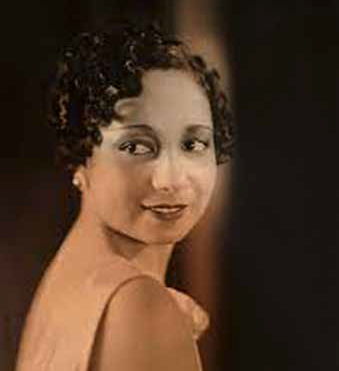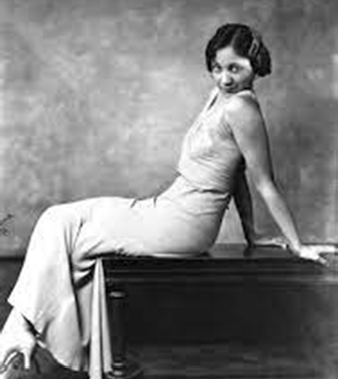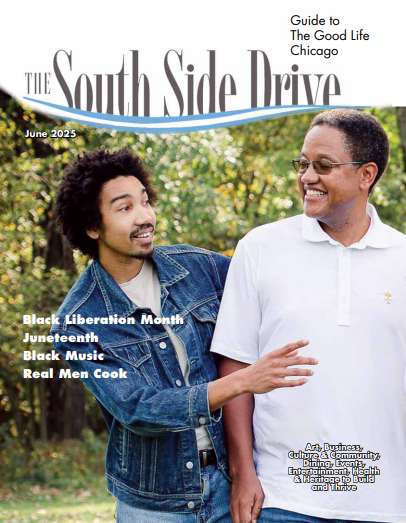
Although she was born in Weimar, Texas,
Etta Moten Barnett was a long-time Chicago resident. In fact, she lived one-third of her life in Chicago longer than she resided in any one city. Thus,
we claim her as Chicago’s own as we pay tribute to her during this Woman’s History Month. Etta Barnett was exceptionally talented as an actress and as a spectacularly gifted contralto vocalist. Like many great African American vocalists,
Etta’s outstanding vocal talent was first recognized when she began singing in the church choir at the age of ten years. The choir, by the way, belonged to the church of the Methodist minister, Rev. Freeman F. Moten, who was Etta’s father. Her mother, Ida Moten, was a school teacher. Etta had three daughters by her first husband, Curtis Brooks, whom she married in 1918. But that marriage only lasted six years. She subsequently met the love of her life, Claude Barnett, in 1934, while living in New York
City, and remained married to Barnett for 33 years. The only thing that separated them was his death in 1967. Claude Barnett was the head of the Associated Negro Press, and it was through that organization that he and Etta had the opportunity to travel frequently, especially to the African continent.
In fact, it was during this time she had the opportunity to meet and interview Reverend Dr. Martin Luther King, Jr.; it wasn’t in his hometown of Birmingham, Alabama; nor in Texas or Chicago or New York,
she interviewed this great preacher and civil rights icon in Acura, Ghana. That interview took place in 1957, before the Internet as we know it even existed. However, years later, when the Internet became the web of all national and international information, that interview was published online by Stanford University’s Martin Luther King, Jr. Research Education Institute.

Etta’s career as an actress, vocalist, and dancer led her to Hollywood, where she appeared in films, such as Busby Berkely’s Gold Diggers of 1933, and the movie, Flying Down to Rio, which starred those famous dancers, Fred Astaire and Ginger Rogers.
In those days, many Black actresses were relegated to stereotypical roles, such as the maid in Gone With the Wind, for which Butterfly McQueen won an Oscar. But Etta Moten Barnett bypassed those stereotypes with her breakthrough roles, as the “Colored Singer” in
Flying Down to Rio and her outstanding vocal
performance of “My Forgotten Man” in Gold
Diggers of 1933. Her mesmerizing performance
of “My Forgotten Man” so impressed President Franklin Delano Roosevelt and First Lady Eleanor Roosevelt that Etta was invited to the White House to perform that song for FDR’s birthday celebration.
Chicago’s Triple Threat 1901 - 2004
By Emma Young
Most notably, Barnett starred on Broadway in a revival of Porgy and Bess. In November 1942, the Porgy and Bess opera at the Studebaker Theatre in Chicago starred Barnett and Todd Duncan. Ida Gershwin had to rewrite the part of Bess because Etta would not sing the n-word, and Gershwin removed it. Barnett also charmed audiences around the world singing in concerts with the Duke Ellington Orchestra. After her performing career and after her husband, Claude, died in 1967, Etta lived in Chicago where she hosted a radio show in the Windy City called I Remember When. Dozens of recordings of I Remember When are available at the Library of Congress and at the Schomburg Library in New York City. During that time, the United States government appointed Etta to be a representative on cultural missions to ten African nations. Although she loved traveling to Africa, Chicago remained her home until her death from pancreatic cancer at the age of 102 in Chicago’s Mercy Hospital.

Etta was deeply involved in civic affairs, women’s issues, and causes, such as, African independence. She was a major philanthropist and civic activist, raising funds for and supporting cultural, social, and church institutions. She received citations and honorary degrees from Spelman College, Lincoln University, and the University of Illinois for her artistry and humanitarian work. In 1979, she was inducted into the Black
Filmmakers Hall of Fame and was named by the Texas Women’s Chamber of Commerce one of the twentieth
century’s one hundred most influential Texas women. She also served as a board member of both The Links (a service
organization for African-American women) and her sorority (Alpha Kappa
Alpha). She received an award for her contributions to American Music by Atlanta University, and a scholarship
was established in her name for minority students at the Chicago Academy for the Performing Arts. A collection of her manuscripts, correspondence, programs, clippings, photographs, and memorabilia can be found at the Carter G. Woodson Regional Library in the Vivian G. Harsh Research Collection.
We are proud to name Etta Moten Barnett as one more Chicago woman who made her city proud by her outstanding talent, her commitment to civil rights, and her wonderful spirit of giving.








